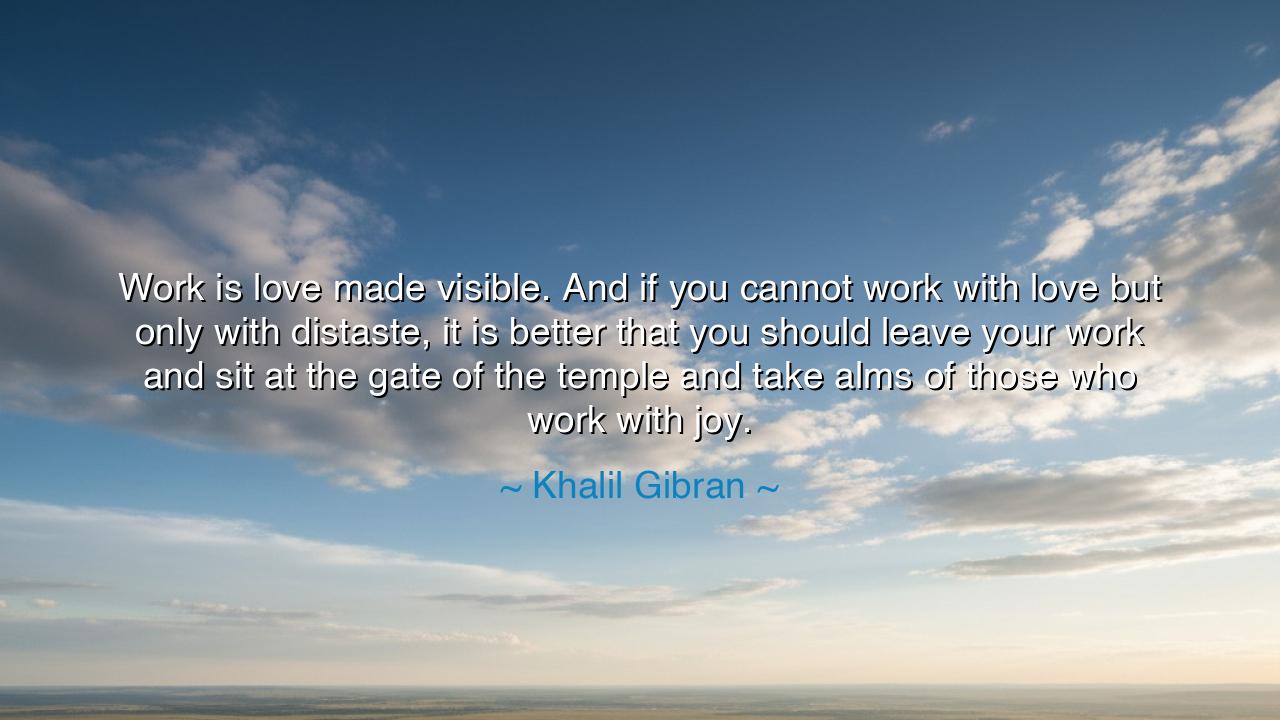
Work is love made visible. And if you cannot work with love but
Work is love made visible. And if you cannot work with love but only with distaste, it is better that you should leave your work and sit at the gate of the temple and take alms of those who work with joy.






“Work is love made visible. And if you cannot work with love but only with distaste, it is better that you should leave your work and sit at the gate of the temple and take alms of those who work with joy.” Thus wrote Khalil Gibran, the poet of the soul, the voice who wove East and West together in his timeless book The Prophet. These words, gentle yet thunderous, are not merely counsel on labor — they are a revelation about the sacredness of work itself. For Gibran saw that every act, when done in love, becomes divine; and every act done without love, no matter how skillful or grand, becomes hollow.
In his vision, work is not a burden but a form of worship — a prayer spoken through the hands. When the farmer tills his field, when the craftsman carves wood, when the mother tends her child, each is performing a sacred ritual if done with the spirit of love. Through such love, work ceases to be toil and becomes creation. Gibran calls this “love made visible,” for love, though invisible, takes shape through the works of those who act with joy, patience, and devotion. The heart, when it pours itself into labor, transforms even the simplest task into a song of the spirit.
Born in Lebanon and raised between worlds, Gibran knew the struggle of men who worked only to survive, their spirits weary and their hearts far from joy. He wrote for them, and for us, reminding all that labor without love is slavery. The man who toils in hatred or bitterness injures his own soul. His work becomes a weight upon him, and what he creates carries the scent of sorrow. Such labor poisons the heart because it separates the worker from his own purpose. Better, says Gibran, to sit humbly at the temple gate — to wait, to reflect — than to desecrate one’s spirit through loveless work. For joyless work is worse than poverty; it is the death of the inner life.
Consider the story of Vincent van Gogh, the painter whose hands were poor but whose heart overflowed with love. His art was not for gold nor glory; it was for truth. He saw God in the faces of peasants, in the wheat fields, in the stars trembling above a quiet town. His brush was an instrument of devotion. Though the world mocked him and he lived in misery, his work shone with love made visible. Each stroke of his paint was an offering, and now, long after his death, his love still breathes through his colors. He worked not for reward, but because his soul could not be silent.
Gibran’s wisdom calls each of us to this same awakening. Whatever our craft — whether we build, teach, heal, write, or serve — we must find in it the pulse of love. For love alone sanctifies effort. The baker who kneads bread with joy nourishes not only the body, but the heart of all who eat. The teacher who delights in her students shapes not minds alone, but spirits. Even the smallest act — sweeping a floor, writing a letter, tending a garden — becomes noble when performed with care and gratitude.
But if we find no joy, if our work becomes a burden filled with resentment and emptiness, Gibran’s words urge us to pause. To sit at the gate of the temple — to step away and seek renewal of heart. For work done without love wounds both the worker and the world. We must learn to listen again to what calls us, to find the path where our labor and our longing are one. For in that union, life regains its holiness.
So, O children of toil and dream, take this lesson deeply into your heart: your work is your prayer. Do it with devotion. Let love be the breath that moves your hands, the rhythm that guides your days. If you cannot yet love what you do, then work to find what you can love. For the world is built not by labor alone, but by the spirit that infuses it.
In the end, Gibran’s truth stands eternal: to work with love is to live with purpose. It is to weave joy into the fabric of the world, to leave behind not mere things, but blessings. When you rise in the morning, let your labor be an act of gratitude. Pour yourself into it, not for reward, but for the sheer beauty of creation. For love is not only felt — it is made visible in every hand that serves with joy, and in every heart that dares to turn its work into worship.






AAdministratorAdministrator
Welcome, honored guests. Please leave a comment, we will respond soon